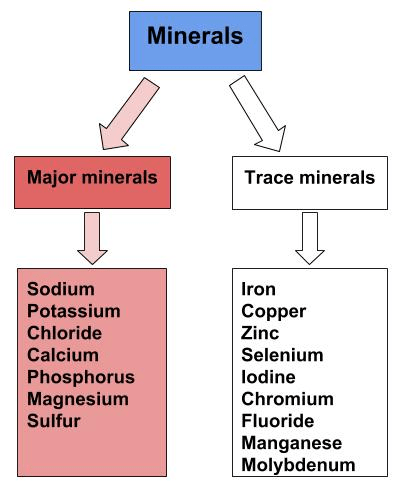Minerals are inorganic elements needed by the body in varying amounts to perform numerous vital functions. Mineral are an essential part of our body weight, but they are quite important for optimum health. This is a thorough examination of their roles, classification, and the effects of mineral deficiencies.
Table of Contents
Classification of Minerals
Minerals can be broadly classified based on the amount the body requires:
- Major Mineral: These mineral are required in comparatively high doses (over 100 mg per day). Building bones and teeth, controlling bodily fluids, maintaining muscle tone, and carrying out numerous biochemical reactions all depend on them. Examples include:
- Calcium
- Phosphorus
- Magnesium
- Sodium
- Potassium
- Chloride
- Sulfur
- Trace Mineral: These are mineral required in smaller amounts (less than 100mg daily) but are still crucial for various bodily functions. Examples include:
- Iron
- Zinc
- Iodine
- Selenium
- Copper
- Manganese
- Fluoride

It’s important to note that this is a general classification, and specific daily requirements for each mineral can vary depending on factors like age, sex, and health conditions.
Functions of Minerals
Minerals play a wide range of essential roles in the body:
- Bone Health: Calcium, phosphorus, and magnesium are crucial for building and maintaining strong bones and teeth.
- Muscle Function: Minerals like calcium, magnesium, potassium, and sodium are essential for proper muscle contraction and nerve transmission.
- Fluid Balance: Sodium, potassium, and chloride help regulate fluid balance within and around cells, maintaining proper blood pressure.
- Enzyme Activity: Many mineral act as cofactors for enzymes, which are protein catalysts that accelerate essential chemical reactions in the body.
- Immune Function: Zinc, selenium, and iron play a role in supporting the immune system and fighting off infections.
- Blood Production: Iron is a vital component of hemoglobin in red blood cells, which carries oxygen throughout the body.
- Hormone Production: Iodine is essential for the production of thyroid hormones, which regulate metabolism and various bodily functions.

Deficiency of Minerals
A deficiency in any mineral can lead to various health problems depending on the specific mineral and the severity of the deficiency. Here are some examples:
- Calcium Deficiency: Can lead to weak bones, osteoporosis, and increased risk of fractures.
- Iron Deficiency: Can cause anemia, characterized by fatigue, weakness, and pale skin.
- Zinc Deficiency: Can impair immune function, wound healing, and taste perception.
- Iodine Deficiency: Can lead to goiter, a swelling of the thyroid gland, and cognitive impairments.
- Sodium Deficiency: Can cause hyponatremia, leading to muscle cramps, weakness, and confusion.
- Potassium Deficiency: Can cause muscle weakness, fatigue, and irregular heartbeat.
Mineral deficiencies can be brought on by a number of things, such as poor absorption, certain medical disorders, and insufficient food consumption.
Maintaining Mineral Balance
To ensure you get the essential minerals your body needs, you can follow these tips:
- Eat a balanced diet: Incorporate into your diet a range of fruits, vegetables, whole grains, legumes, nuts, seeds, and lean protein sources. Numerous important mineral are found in these meals naturally.
- Consider fortified foods: Iron and calcium are two examples of mineral added to fortified foods. These can be useful solutions, particularly if diet isn’t enough to suit your demands.
- Consult a healthcare professional: If you have concerns about mineral deficiencies, they can advise you on dietary modifications or recommend supplements if necessary.
By understanding the classification, functions, and deficiency effects of mineral, you can make informed dietary choices and ensure your body has the necessary building blocks for optimal health and well-being.
Frequently Asked Questions (FAQs)
What are the classification of minerals?
The Dana Classification System originally listed nine main mineral classes: Native Elements, Sulfides, Sulfates, Halides, Oxides, Carbonates, Phosphates, Silicates, and Organic Minerals.
What are 4 functions of minerals?
Minerals support the body’s pH neutrality by preserving the acid-base equilibrium. They support the homeostasis of bodily systems, including the enzyme systems. They are involved in muscular contraction and nerve impulse transmission. They aid in the food’s energy release.
What is the deficiency of minerals?
A mineral deficiency occurs when your body doesn’t obtain or absorb the required amount of a mineral. The human body requires different amounts of each mineral to stay healthy.
Related Articles

